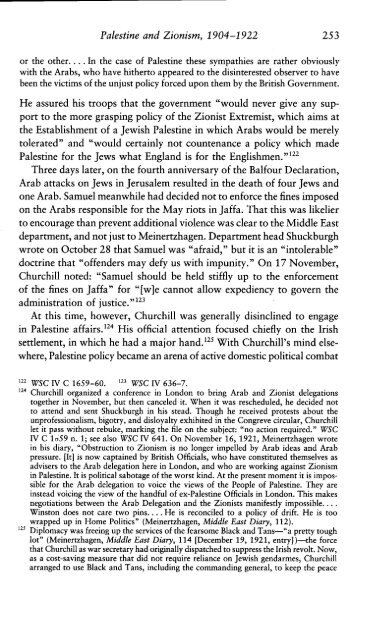Churchill, Palestine and Zionism, 1904-1922 - Douglas J. Feith
Churchill, Palestine and Zionism, 1904-1922 - Douglas J. Feith
Churchill, Palestine and Zionism, 1904-1922 - Douglas J. Feith
Create successful ePaper yourself
Turn your PDF publications into a flip-book with our unique Google optimized e-Paper software.
<strong>Palestine</strong> <strong>and</strong> <strong>Zionism</strong>, <strong>1904</strong>-<strong>1922</strong> 253<br />
or the other. ... In the case of <strong>Palestine</strong> these sympathies are rather obviously<br />
with the Arabs, who have hitherto appeared to the disinterested observer to have<br />
been the victims of the unjust policy forced upon them by the British Government.<br />
He assured his troops that the government "would never give any support<br />
to the more grasping policy of the Zionist Extremist, which aims at<br />
the Establishment of a Jewish <strong>Palestine</strong> in which Arabs would be merely<br />
tolerated" <strong>and</strong> "would certainly not countenance a policy which made<br />
<strong>Palestine</strong> for the Jews what Engl<strong>and</strong> is for the Englishmen."122<br />
Three days later, on the fourth anniversary of the Balfour Declaration,<br />
Arab attacks on Jews in Jerusalem resulted in the death of four Jews <strong>and</strong><br />
one Arab. Samuel meanwhile had decided not to enforce the fines imposed<br />
on the Arabs responsible for the May riots in Jaffa. That this was likelier<br />
to encourage than prevent additional violence was clear to the Middle East<br />
department, <strong>and</strong> not just to Meinertzhagen. Department head Shuck burgh<br />
wrote on October 28 that Samuel was "afraid," but it is an "intolerable"<br />
doctrine that "offenders may defy us with impunity." On 17 November,<br />
<strong>Churchill</strong> noted: "Samuel should be held stiffly up to the enforcement<br />
of the fines on Jaffa" for "[w]e cannot allow expediency to govern the<br />
administration of justice.,,123<br />
At this time, however, <strong>Churchill</strong> was generally disinclined to engage<br />
in <strong>Palestine</strong> affairs. 124 He assured his troops that the government "would never give any support<br />
to the more grasping policy of the Zionist Extremist, which aims at<br />
the Establishment of a Jewish <strong>Palestine</strong> in which Arabs would be merely<br />
tolerated" <strong>and</strong> "would certainly not countenance a policy which made<br />
<strong>Palestine</strong> for the Jews what Engl<strong>and</strong> is for the Englishmen."122<br />
Three days later, on the fourth anniversary of the Balfour Declaration,<br />
Arab attacks on Jews in Jerusalem resulted in the death of four Jews <strong>and</strong><br />
one Arab. Samuel meanwhile had decided not to enforce the fines imposed<br />
on the Arabs responsible for the May riots in Jaffa. That this was likelier<br />
to encourage than prevent additional violence was clear to the Middle East<br />
department, <strong>and</strong> not just to Meinertzhagen. Department head Shuck burgh<br />
wrote on October 28 that Samuel was "afraid," but it is an "intolerable"<br />
doctrine that "offenders may defy us with impunity." On 17 November,<br />
<strong>Churchill</strong> noted: "Samuel should be held stiffly up to the enforcement<br />
of the fines on Jaffa" for "[w]e cannot allow expediency to govern the<br />
administration of justice.,,123<br />
At this time, however, <strong>Churchill</strong> was generally disinclined to engage<br />
in <strong>Palestine</strong> affairs. His official attention focused chiefly on the Irish<br />
settlement, in which he had a major h<strong>and</strong>.125 With <strong>Churchill</strong>'s mind elsewhere,<br />
<strong>Palestine</strong> policy became an arena of active domestic political combat<br />
124 His official attention focused chiefly on the Irish<br />
settlement, in which he had a major h<strong>and</strong>.125 With <strong>Churchill</strong>'s mind elsewhere,<br />
<strong>Palestine</strong> policy became an arena of active domestic political combat<br />
122 WSC IV C 1659-60. 123 WSC IV 636-7.<br />
124 <strong>Churchill</strong> organized a conference in London to bring Arab <strong>and</strong> Zionist delegations<br />
together in November, but then canceled it. When it was rescheduled, he decided not<br />
to attend <strong>and</strong> sent Shuck burgh in his stead. Though he received protests about the<br />
unprofessionalism, bigotry, <strong>and</strong> disloyalty exhibited in the Congreve circular, <strong>Churchill</strong><br />
let it pass without rebuke, marking the file on the subject: "no action required." WSC<br />
IV C 1059 n. 1; see also WSC IV 641. On November 16, 1921, Meinertzhagen wrote<br />
in his diary, "Obstruction to <strong>Zionism</strong> is no longer impelled by Arab ideas <strong>and</strong> Arab<br />
pressure. [It] is now captained by British Officials, who have constituted themselves as<br />
advisers to the Arab delegation here in London, <strong>and</strong> who are working against <strong>Zionism</strong><br />
in <strong>Palestine</strong>. It is political sabotage of the worst kind. At the present moment it is impossible<br />
for the Arab delegation to voice the views of the People of <strong>Palestine</strong>. They are<br />
instead voicing the view of the h<strong>and</strong>ful of ex-<strong>Palestine</strong> Officials in London. This makes<br />
negotiations between the Arab Delegation <strong>and</strong> the Zionists manifestly impossible ....<br />
Winston does not care two pins .... He is reconciled to a policy of drift. He is too<br />
wrapped up in Home Politics" (Meinertzhagen, Middle East Diary, 112).<br />
125 Diplomacy was freeing up the services of the fearsome Black <strong>and</strong> Tans-"a pretty tough<br />
lot" (Meinertzhagen, Middle East Diary, 114 [December 19, 1921, entry])-the force<br />
that <strong>Churchill</strong> as war secretary had originally dispatched to suppress the Irish revolt. Now,<br />
as a cost-saving measure that did not require reliance on Jewish gendarmes, <strong>Churchill</strong><br />
arranged to use Black <strong>and</strong> Tans, including the comm<strong>and</strong>ing general, to keep the peace


